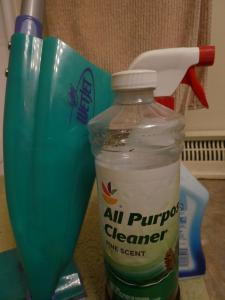Toxic Cleaning Solution Myths
- posted: May 31, 2019

The internet and social media can be great for finding information and for entertainment. However, there is a lot of misinformation out there, too. This week, we look at some long-standing rumors about products thought to be toxic to pets, and one cleaning solution that may be harmful.
First up: Swiffer Wet Jet solution was widely trashed as being toxic to cats and dogs. But the reality is, if used properly, Swiffer or similar wet floor cleaning solutions are perfectly safe. It was rumored to contain ethylene glycol, a solution found in anti-freeze which IS toxic to pets. Wet Jet solution contains non-toxic propylene glycol and other chemicals. So, don’t let your pet drink the solution or lick a wet floor, but the most you might see is an upset stomach if your pet accidentally ingests this cleaning solution.
Next: Febreze spray was once thought to be toxic to dogs and birds. The original formula contained zinc oxide which has now been removed, but no actual pet deaths were linked to use of Febreze and the ASPCA poison control website lists it as being absolutely safe to use around pets. That being said, if you have an asthmatic cat or dog with respiratory problems, you may want to limit use of any room fresheners or aerosol sprays as they may exacerbate respiratory issues, but there is nothing inherently toxic in Febreze.
Third: Toilet bowl tablets. Those tablets that you put in your toilet tank or hang on the side of the bowl that freshen the tank and sometimes turn the water a lovely shade of aqua seem like they would be bad news if your dog decided to drink the blue water, but, turns out they aren’t so bad. While you should certainly keep the lid closed to prevent your pet from drinking toilet water in general because…eww!—no one wants kisses from pets drinking toilet water even if your bowl is spotless—the tablets are diluted in the water and the worst you may see is some stomach upset. However, be sure your pet cannot ingest the actual tablet or gel as this could cause more serious problems.
Finally, a Maybe?: Pine-Sol or Lysol. While Pine-Sol and Lysol brands that are commercially available to the public no longer appear to contain pine oil or phenols which can be toxic, especially to cats, do use caution with any similar cleaners that contain actual pine oil and with any cleaning products that contain phenols. If ingested or inhaled, pine oil can cause severe respiratory problems and can affect liver enzymes. Licking the products can also cause ulcers in the mouth and on the tongue. As with any cleaning solution, used properly diluted in a well-ventilated area and not allowing pets to come into contact with wet surfaces or to have direct access where spills or ingestion might occur, pets should be fine, but check ingredients and limit use of pine oils and similar cleaners around cats.
So, there you have it. Most cleaning solutions and air fresheners are fine if used as directed, but, make sure pets cannot directly ingest cleaning products or get them on their paws. And always use caution with aerosol sprays and other chemicals around birds or pets with respiratory illnesses as the strong scents may irritate their lungs.
This blog brought to you by the Patton Veterinary Hospital serving Red Lion, York and the surrounding communities.
https://www.aspca.org/pet-care/animal-poison-control/poisonous-household-products
Schedule an appointment with our team of veterinarians today at (717) 246-3611!
Location
Patton Veterinary Hospital
425 E Broadway
Red Lion, PA 17356
